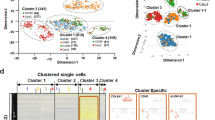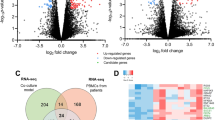Abstract
Eosinophil granule ontogeny transcript (EGOT) is a long noncoding RNA involved in the regulation of eosinophil granule protein transcript expression. However, little is known about the role of EGOT in malignant disease. This study aimed to assess the potential role of EGOT in the pathogenesis of breast cancer. Quantitative real-time polymerase chain reaction was performed to detect the expression levels of EGOT in 250 breast cancerous tissues and 50 adjacent noncancerous tissues. The correlation of EGOT expression with clinicopathological features and prognosis was also analyzed. EGOT expression was lower in breast cancer compared with the adjacent noncancerous tissues (P < 0.001), and low levels of EGOT expression were significantly correlated with larger tumor size (P = 0.022), more lymph node metastasis (P = 0.020), and higher Ki-67 expression (P = 0.017). Moreover, patients with low levels of EGOT expression showed significantly worse prognosis for overall survival (P = 0.040), and this result was further validated in a larger cohort from a public database. Multivariate analysis suggested that low levels of EGOT were a poor independent prognostic predictor for breast cancer patients (HR = 1.857, 95 % CI = 1.032–3.340, P = 0.039). In conclusion, EGOT may play an important role in breast cancer progression and prognosis and may serve as a new potential prognostic target in breast cancer patients.



Similar content being viewed by others
References
DeSantis C, Ma J, Bryan L, Jemal A. Breast cancer statistics, 2013. CA Cancer J Clin. 2014;64:52–62.
Dunham I, Kundaje A, Aldred SF, Collins PJ, Davis CA, Doyle F, et al. An integrated encyclopedia of DNA elements in the human genome. Nature. 2012;489:57–74.
Mercer TR, Dinger ME, Mattick JS. Long noncoding RNAs: insights into functions. Nat Rev Genet. 2009;109:155–9.
Wilusz JE, Sunwoo H, Spector DL. Long noncoding RNAs: functional surprises from the RNA world. Genes Dev. 2009;23:1494–504.
Huarte M, Rinn JL. Large non-coding RNAs: missing links in cancer? Hum Mol Genet. 2010;19:R152–61.
Wagner LA, Christensen CJ, Dunn DM, Spangrude GJ, Georgelas A, Kelley L, et al. EGO, a novel, noncoding RNA gene, regulates eosinophil granule protein transcript expression. Blood. 2007;109:5191–8.
Gyorffy B, Lanczky A, Eklund AC, Denkert C, Budczies J, Li Q, et al. An online survival analysis tool to rapidly assess the effect of 22,277 genes on breast cancer prognosis using microarray data of 1809 patients. Breast Cancer Res Treat. 2010;123:725–31.
Kapranov P, Cheng J, Dike S, Nix DA, Duttagupta R, Willingham AT, et al. RNA maps reveal new RNA classes and a possible function for pervasive transcription. Science. 2007;316:1484–8.
Amaral PP, Clark MB, Gascoigne DK, Dinger ME, Mattick JS. LncRNAdb: a reference database for long noncoding RNAs. Nucleic Acids Res. 2010;39:D146–51.
Luo JH, Ren BG, Keryanov S, Tseng GC, Rao UN, Monga SP, et al. Transcriptomic and genomic analysis of human hepatocellular carcinomas and hepatoblastomas. Hepatology. 2006;44:1012–24.
Lin R, Maeda S, Liu C, Karin M, Edgington TS, et al. A large noncoding RNA is a marker for murine hepatocellular carcinomas and a spectrum of human carcinomas. Oncogene. 2007;26:851–8.
Yamada K, Kano J, Tsunoda H, Yoshikawa H, Okubo C, Ishiyama T, et al. Phenotypic characterization of endometrial stromal sarcoma of the uterus. Cancer Sci. 2006;97:106–12.
Gupta RA, Shah N, Wang KC, Kim J, Horlings HM, Wong DJ, et al. Long non-coding RNA HOTAIR reprograms chromatin state to promote cancer metastasis. Nature. 2010;464:1071–6.
Rinn JL, Kertesz M, Wang JK, Squazzo SL, Xu X, Brugmann SA, et al. Functional demarcation of active and silent chromatin domains in human HOX loci by noncoding RNAs. Cell. 2007;129:131–23.
Mourtada-Maarabouni M, Pickard MR, Hedge VL, Farzaneh F, Williams GT. GAS5, a non-protein-coding RNA, controls apoptosis and is downregulated in breast cancer. Oncogene. 2009;28:195–208.
Lacoangeli A, Lin Y, Morley EJ, Muslimov IA, Bianchi R, Reilly J, et al. BC200 RNA in invasive and preinvasive breast cancer. Carcinogenesis. 2004;25:2125–33.
Lottin S. Overexpression of an ectopic H19 gene enhances the tumorigenic properties of breast cancer cells. Carcinogenesis. 2002;23:1885–95.
Huang J, Zhou N, Watabe K, Lu Z, Wu F, Xu M, et al. Long noncoding RNA UCA1 promotes breast tumor growth by suppression of p27 (Kip1). Cell Death Dis. 2014;5:e1008.
Askarian-Amiri ME, Crawford J, French JD, Smart CE, Smith MA, Clark MB, et al. SNORD-host RNA Zfas1 is a regulator of mammary development and a potential marker for breast cancer. RNA. 2011;17:878–91.
Lori AW, Clarissa JC, Diane MD, Gerald JS, Ann G, Linda K, et al. EGO, a novel, noncoding RNA gene, regulates eosinophil granule protein transcript expression. Blood. 2007;15(109):8.
Acknowledgments
The study was supported by research grants from the Harbin Medical University Graduate Student Innovation Fund Project (YJSCX2014-03HYD) and Haiyan Fund Project of Harbin Medical University Cancer Hospital (JJMS2014-05).
Conflicts of interest
None.
Author information
Authors and Affiliations
Corresponding author
Rights and permissions
About this article
Cite this article
Xu, Sp., Zhang, Jf., Sui, Sy. et al. Downregulation of the long noncoding RNA EGOT correlates with malignant status and poor prognosis in breast cancer. Tumor Biol. 36, 9807–9812 (2015). https://doi.org/10.1007/s13277-015-3746-y
Received:
Accepted:
Published:
Issue Date:
DOI: https://doi.org/10.1007/s13277-015-3746-y




